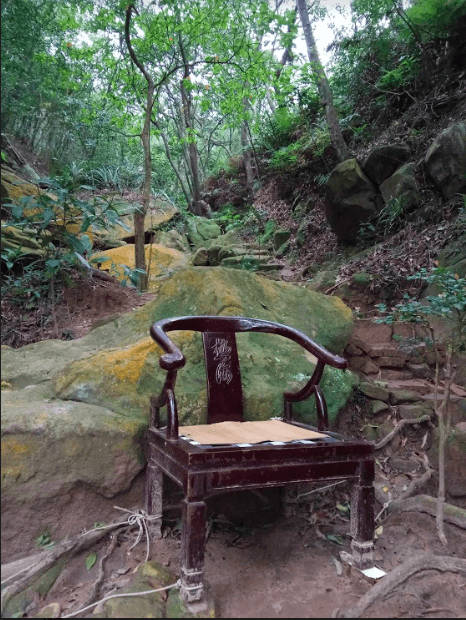[A]time-darkened chair of oak, it stood among other chairs of other kinds, empty of all but time and craft, in a warehouse for antiques; a sign said the chair had been made in England a couple of hundred years ago. It was a spoked, round-back chair with arms, a practical chair, its seat a single slab of wood, selected with care that the beautiful grain would be polished to this very sheen by centuries of backsides, and it looked in the physical language inviting so I sat in it.
The chair had been made for the body the way only a lifelong maker of chairs for folks he will see every day for the rest of his life makes a chair. It wasn’t a quick production line assembly for a never-known stranger somewhere else in the world; it was the hand-fashioned essence of chair, that the maker himself had been fashioning, by way of his family, for three or four hundred years or even more, until his fingers, hands and heart knew vastly more than just how to make chairs the feeling was born into the hands by then, and one man could conjure an entire chair, for the entire body, out of wood with just fire and iron, make it sing with function.
I could feel that song in my self when I leaned my back upon the back of the chair and lay my arms upon its arms, my hands coming to rest where hands had been anticipated with simple grace, the maker saying to me thus eloquently over centuries that he had known how and where my elbows and hands would come to rest, how they would want to rest and how to welcome them where hands had in fact been coming to rest for centuries are we not one, after all, for here was a chair that was made for the one we each are: not a market unit but a person, with whom a chair should be a private conversation.
It was a chair made to last beyond a life, like a poem or a song, the craft of it to be remembered, another form of the name of the maker, of himself and the grace of his hands to be passed on and spoken of, sung of in wood, taken good comfort in, and I realized I had in all my years on earth never been so well understood by a chair; no chair had ever told me of these things.
Every chair I’d ever sat in had been mute, built for a phantom, a non-existent entity, an average consumer. In my time I have sat in many chairs, that made me feel all sorts of ways — from the tubular kind with the plastic caps on the leg-ends that chaired the 1950’s to bags of styrofoam beads to leather/steel trapezoids on legs to straight-back chairs, bentwood chairs, easy chairs, reclining chairs, and on and on, and this was the first chair that had ever, how shall I say it, welcomed me, personally. The back curled round and the arms curled round and I was really in the chair, felt both embraced and rooted as I sat there, rooted like an ancient tree; no postural insistence from the chair, no disquieting tipsiness, no jittery ricketyness, no gangly angularity, no shoddy looseness, no shivery tubularity, no artistic misfitting, but solidity: simple, rooted, oaktree solidity, after 200 years of use!!!

What today is made like that? What today like that is made by a man who, like his father and grandfather and further back, has fashioned his very life into comfort for people he knows and will never know, from whom he seeks respect and appreciation, even centuries hence? Sitting in the chair I could feel in my heart as in my body every measure of the distance we have come from all the things that in their ways once filled life quietly and elegantly to the brim, how things in themselves used to tell us of one another, and show in their use the care that resided in what we crafted, how wholeheartedly we gave of our lives in our creations.
This was a chair that had been made by transforming the beauty of trees through the beauty of hands into the beauty of chairs. How far from there we are, on the chairs that bear us now, when we never set eyes on or even sense who makes the chairs we use, and more and more likely it’s not even a who but a series of whats, as the spirit of hands fades from the products around us until there isn’t a caress in a carload, and we live unknown by our surroundings is what the chair said, with an eloquence increasingly lost to our time.



